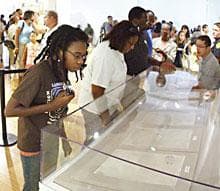Advertisement
Remembering Emancipation
Resume
In the midst of civil war and politics and military challenge, Lincoln’s act was narrowly aimed at slaves under Confederate control. Their bondage remained unbroken — and once broken, gave way to many decades of Jim Crow oppression.
But the Emancipation Proclamation stands as a national watershed. Now, with Barack Obama headed for the White House, its history speaks again. On January 20, Obama will lay his hand on Lincoln's Bible to take his oath as President of the United States. It's a good moment to look back on history.
This hour, On Point: The Emancipation Proclamation and its resonance today.
You can join the conversation. Barack Obama reveres "the Great Emancipator," Abraham Lincoln. Do you? And how do Lincoln's acts echo this year in Washington? Tell us what you think.
Guests:
Joining us from Washington is Edna Greene Medford, associate professor of history at Howard University. She specializes in 19th-century African-American history and is co-author of "The Emancipation Proclamation: Three Views," with Harold Holzer and Frank Williams.
And from Hanover, N.H., is Jack Beatty, On Point news analyst and senior editor at The Atlantic. He's written about 19th-century American history himself, most recently in his book "Age of Betrayal: The Triumph of Money in America, 1865-1900."
More links:
The National Archives website features a digital reproduction of the original Emancipation Proclamation, as well as the text version; the "preliminary" proclamation of September 22, 1862; and a background essay by historian John Hope Franklin.
In the November 1862 issue of The Atlantic Monthly, Ralph Waldo Emerson reacted to Lincoln's Preliminary Emancipation Proclamation in an essay, and the national mythology was born before the proclamation had even been signed:
It is not a measure that admits of being taken back. Done, it cannot be undone by a new Administration.... This act makes that the lives of our heroes have not been sacrificed in vain....
With this blot removed from our national honor, this heavy load lifted off the national heart, we shall not fear henceforward to show our faces among mankind. We shall cease to be hypocrites and pretenders, but what we have styled our free institutions will be such.
In December 1866, also in The Atlantic, Frederick Douglass appealed to the United States Congress to live up to the promise of Lincoln's proclamation:
Whether the tremendous war so heroically fought and so victoriously ended shall pass into history a miserable failure, barren of permanent results, — a scandalous and shocking waste of blood and treasure ... or whether, on the other hand, we shall, as the rightful reward of victory over treason have a solid nation, entirely delivered from all contradictions and social antagonisms, based upon loyalty, liberty, and equality, must be determined one way or the other by the present session of Congress.
As we know, it would be a century, and more, before liberty and equality began to be realized for African Americans.